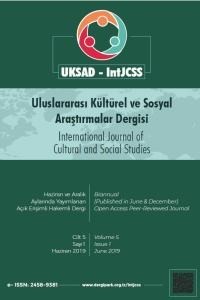Social Media in the Academic Life of International Students in Turkey: A Survey Study
Social Media, Academic life International Students, Turkey,
___
- Aghaee, N.M. (2010) “Social Media Use in Academia: Campus Students Perceptions of How Using Social Media Supports Educational Learning”, Magister thesis, Uppsala University, Department of Computer and System Science, Uppsala, Sweden.
- Anabel, Q-H.; Alyson, Y. (2010).“Uses and gratifications of social media: A comparison of Facebook and instant messaging “Bulletin of Science, Technology and Society, 30(5), 350-361.
- Boateng, R.O.; Amankwaa, A. (2016). The Impact of Social Media on Student Academic Life in Higher Education. Global Journal of Human-Social Science (G), 16(4), 2249-460x international students. International Student Experience Journal, 2(1), 2014
- Grace, S, Abbott, W., Donaghey, J. McDonald, C. (2012). "Social Media for International Students: It's Not All About Facebook." Proceedings of the IATUL Conferences. Paper 19. Accessed from: http://docs.lib.purdue.edu/iatul/2012/papers/19, 14 October, 2016
- Hall , .K. Holly and Thillainatarajan, S., (2014). Social media use among international students. International Student Experience Journal (ISEJ). 2(1), 2014
- Helou, A.M.; Ab.Rahim, N.Z. (2014). The Influence of Social Networking Sites on Students’ Academic Performance in Malaysia. International Journal of Electronic Commerce Studies, .5(2), 247-254
- Jih-Hsuan, L; Wei, P.; Mijung, K.; Robert, L. (2011). Social Networking and among International Students. Journal of New Media & Society, from nms.sagepub.com
- Kaplan, A.M.; Haenlein, M. (2012). Social Media: Back to the Roots and Back to the Future. Journal of Systems and Information Technology 14(2), 101-104.
- Marisol, G.; Sergio, R.; Pedro, F. (2012). A Descriptive Study of the Academic Use of Social Networks among University Students. Scientific Journal of Media Education. http://www.revistacomunicar.com (Accessed: 16/03/2016)
- Perry, D.K. (2002) Theory and Research in Mass Communication Contexts and Consequences2nd Ed, New Jersey: Lawrence Erlbaum Associates Publishers.
- Pfeiffer, D. (2001). Academic and Environmental Stress Among Undergraduate And Graduate College Students: A Literature Review. Master Research Paper, University of Wisconsin-Stout, Department of Guidance and Counseling-Mental Health, USA.
- Salvation, M.; Adzharuddin, N.A. (2014). The Influence of Social Network Sites (SNS) upon Academic Performance of Malaysian Students. International Journal of Humanities and Social Science, 4(10), 131-137.
- Tural, N.K. (2007). Universities and Academic Life in Turkey: Changes and Challenges. International Journal of Educational Policies. 1 (1)63-78.
- Wimmer, R.; Dominick, J. (2011) Mass Media Research: An Introduction, 9th Ed, Wadsworth, Boston.
- Internet Resources International Trends in Higher Education, University of Oxford International Strategy Office, 2015 Accessed on 30/11/16 at: https://www.ox.ac.uk/sites/files/oxford/International%20Trends%20in%20Higher%20Education%202015 What Defines an International Student? A Look Behind the Numbers. World Education News & Reviews. Accessed : 30/11/16) Accessed at http://wenr.wes.org/2009/09/wenr- september-2009- feature
- https://en.wikipedia.org/wiki/International_student, (Accessed 29.11.2016).
- http://www.internationalstudentsymposium.com/en/?page_id=2240; (Accessed 14.10.2016).
- http://www.dailysabah.com/education/2015/05/07/turkey-aims-to-educate-100000-international-students-in-2018 (Accessed 18.03.2016).
- www.kalkinma.gov.tr (Accessed 27.02. 2016).
- Başlangıç: 2015
- Yayıncı: Mutlu TÜRKMEN
Genç Bireylerin Turistik Tercihlerinin Belirlenmesi Üzerine Balıkesir Kent Merkezinde Bir Araştırma
Farklı Yaş Gruplarındaki Lisanslı Tenisçilerin Görsel ve İşitsel Reaksiyon Zamanlarının İncelenmesi
Ender EREN, Recep Sürhat MÜNİROĞLU, Uğur ÖZER
Bartın Üniversitesinde Öğrenim Gören Öğrencilerin Spora Yönelik Tutumlarının Belirlenmesi
Rukiye VAROL, Serkan VAROL, Mutlu TÜRKMEN
İletişim Fakültesi Ders Müfredatlarının Sektörün Nitelikli İşgücü Talebine Uyumu
Ali BÜYÜKASLAN, Korhan MAVNACIOĞLU
Örgütiçi İletişim Becerilerinin İşgören Performansı Üzerine Etkileri
Serhat UÇAR, Hasan Ali KIZILASLAN
Erzurum Yöresi Halk Oyunları Müziğinin Müzikal Yapılarının İncelenmesi
